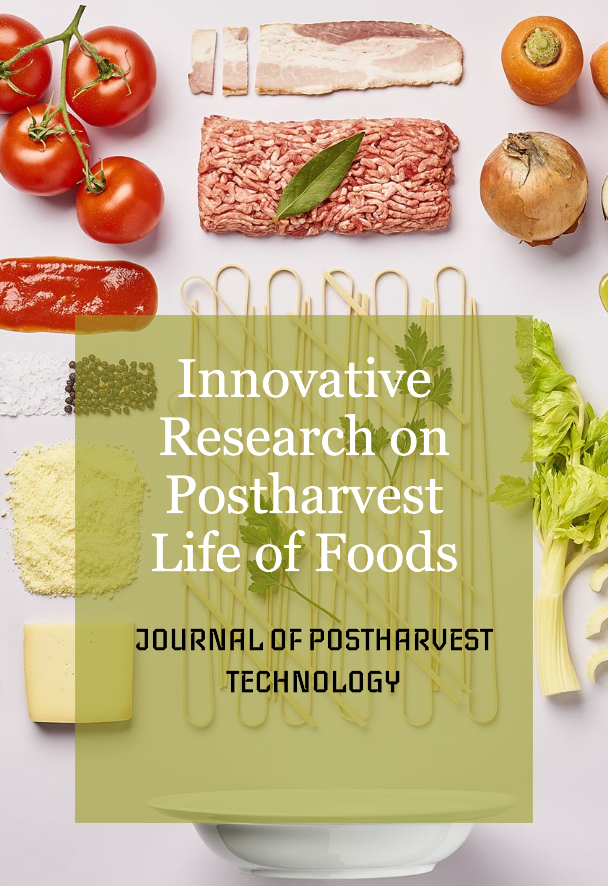Preparation and Standardization of Mixed Vegetable
Abstract
The aim of the present work was to utilize the surplus vegetables for the preparation of sauce. For this, a sum of nine treatments combining different vegetables was used to prepare the sauce following the standard method. The vegetable used were potato, carrot, bottle gourd, palak, coriander, green chilli, pumpkin, beetroot, cabbage, cauliflower, and bean. The TSS, total solids, and acidity were increased irrespective of the combination whereas the sensory attributes were tended to decrease during the storage. The combination 5 [pumpkin (28%), beetroot (28%), cabbage (17%), palak (17%), coriander (5%), and green chili (2%)] has been found the best among the all combination and treatments. Considering the organoleptic attributes, the cost benefit ratio of the C5 was 1:2. The results suggest that the unmarketable vegetables could be used for value addition especially during glut to have better remuneration.
References
Akbudak, B., Bolkan, H. and Cohen, N. 2009. Determination of physicochemical characteristics in different products of tomato varieties. International Journal Food Science and. Nutrition, 60: 126-138.
Bozkurt, H. and Osman Erkmen. 2004. Effects of production techniques on the quality of hot pepper paste. Journal Food Engineering, 64:173-
Chakraborty, I., Vanlalliani, Chattopadhyay, A. and Hazra, P. 2007. Studies on processing and nutritional qualities of tomato as influenced by genotypes and environment. Vegetable Science, 34: 26-31.
Dreosti, IE. 1993. Vitamins A, C, E and beta-carotene as protective factors for some cancers. Asia Pacific Journal Clinical Nutrition, 2: 5-21.
Gould, W.A. 1992. Tomato production,
processing and technology. Baltimore: CTI Publ.
Jayashree, E. John Zachariah, T. Evangelin F.P.P. and R. Susheela Bhai 2012. Qualitative changes during storage of
different ginger-based spice sauces.
Journal Horticultural Science, 7: 174-192.
NHB, Gurgaon. 2012. Final estimate for 2011-12
Siddiqui, M.W., Ayala-Zavala, J. F., and Dhua, R. S. 2015. Genotypic variation in tomatoes affecting processing and antioxidant attributes. Critical Reviews in Food Science
and Nutrition. DOI:
1080/10408398.2012.710278 (In
Press)
Siddiqui, M.W., Chakraborty, I., Ayala Zavala, J.F. and Dhua, R. S. 2011. Advances in minimal processing of fruits and vegetables: A Review. Journal of Scientific and Industrial Research, 70 (9): 823- 834.
Siddiqui, M.W., Chakraborty, I., Hazra, P. and Ayala-Zavala, J.F. 2014.
Characterization of quality indices on
storage of purees prepared from
mutant (dg and ogc) and normal tomatoes. Acta Alimentaria, 43(3): 426–436. DOI: 10.1556/AAlim.43.2014.3.9
Siddiqui, M.W., Yadav, S. K., Dhua, R. S. and Ahmad, M. S. 2014. Ensuring
food security through Golden Revolution: prospects, achievements, and bottlenecks. International Food
Research Journal, 21(4): 1235-1241.
Spiezer, FE: Colditz, GA; Hunder, DJ; Rosner B and Hennekens, C. 1999. Prospective study of smoking, antioxidant intake and lung cancer in
middle aged women. Cancer Causes and Control. 10:475-482.
World Health Organization. The world health report 2002. Reducing risks, promoting healthy life. Geneva, World Health Organization 2002.




